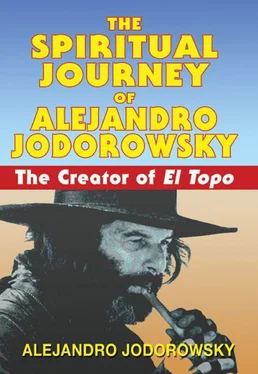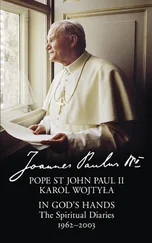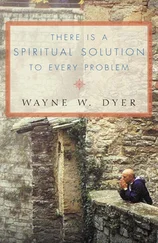How could I have understood all this without verifying it by my visit to Globos? I believed I had escaped the frivolous absurdity of such cabarets, freeing myself from trivial material pursuits by plunging myself in meditation in the zendo with Ejo. Yet Kyosho showed me that no one escapes anything. We live in a world that includes an ocean of minds that are asleep. To be conscious is to become the eyes of this blind world. When the monk asks, “And you, Sensei?” he shows that he still does not understand. He still separates the world of materialism from the world of the master, who is free of desire. With great patience, Kyosho explains: “I can understand myself almost perfectly.” Who is this self? A limited individual? Not at all. This self is all of humanity, the entire cosmos and that which gives it life. The “almost” refers to the limitation of the human point of view, which is necessarily subjective and imperfect. Perfection can be only divine. Humanity, including all matter, permanently impermanent, can only approach perfection.
But the monk stubbornly persists, trying to grasp everything with intellect and words instead of direct perception. “What does it mean, to understand yourself?” It means precisely to see beyond words, allowing yourself to fall into the abyss of the unthinkable. Kyosho administers the coup de grace by pointing out that awakening is easy, but putting it into words is difficult. The disciple imitates the rain, leaving behind the prison of intellect to plunge into the natural phenomenon so that it reaches all the way to the heart.
We continued the rohatsu. After two hours, my body temperature began to rise. My robe dried little by little, emitting a slight cloud of vapor. With tenacious will, I strove to prevent words from distracting my mind, but each time I seemed about to succeed, the absurd words “I’m about to succeed” spoiled it. So I chose a word at random: guarisapo , meaning “tadpole.” I repeated it endlessly in my mind for a time that seemed an eternity. Even during the forty minutes of sleep, I hung on to guarisapo as if it were a lifebuoy. When Ejo woke me, I did not wait for him to shake me, but resumed my sitting position quickly, straightening my spine, lifting the corners of my lips slightly, and disintegrating the word guarisapo with a mind that was finally empty.
It was a moment of absolute peace, though it was quite brief, unfortunately. As soon as I ceased to produce thoughts, my heart filled the vacuum with loud beating, like a drum resounding in my chest. A slow, pulsing flood began to beat in my temples, the tips of my fingers, my genitals, my calves, my gums, my tongue, my feet. Everything was flooded with this reverberating rhythm. Ultimately, there was not a single part of my body where it could not be felt. Then I felt the constant ebb and flow of my blood circulating. To this was added the song of air moving back and forth from my sinuses to my lungs. Finally, there came the incessant gurgling of my digestive tract. Perhaps it was an auditory hallucination, but I then began to sense that even beyond what was happening in my body, everything that was around me emitted a sound. The floor, the roof, the walls were vibrating as were the zafus, clothes, everything — different tones and rhythms joined together in a chorus that sounded like the sound of a beehive. This sensation extended to include the noise of the city outside and then the earth, the air, the sky. It was such a colossal impression that I began to tremble and felt as if I would faint.
At this point, Ejo shouted: “Don’t fall! Recite the four vows along with me. Though sentient beings are numberless. .”
“. . Though sentient beings are numberless. .”
“. . I vow to save them all. All passions, even the inextinguishable ones, I vow to extinguish them. All Dharmas. .”
“What are Dharmas, Ejo?”
“Even if you don’t understand, be quiet and repeat after me! All Dharmas, though infinite in number, I vow to fulfill. All truth, though immeasurable, I vow to attain. .”
I repeated everything after him. He recited them again and again, louder and louder. Though I followed suit, he shouted constantly, “Say it louder!”
Finally, I was shouting as loud as I could — but he urged me on: “Louder still!”
I felt that my vocal cords would burst. My shouting felt like vomiting, but he was still not satisfied and I began to despair. Seized by a fit of rage and screaming like a madman, I threw my zafu at him. It bounced against his chest, but he did not flinch, continuing to repeat the vows and demanding that I repeat them louder. Seeing red, I leaped at him, intending to throw him to the ground. I don’t know whether it was hallucination or the effect of extreme fatigue, but I could not budge him so much as an inch, though I was shoving him with all my strength. It was as if I was pushing against a stone statue planted in the ground. I even drew back and rushed at him several times, but he was imperturbable. I let out a final yell so loud that a piece of plaster fell from the wall in pieces. Then I collapsed, empty.
At first, Ejo did not cease his recital, but soon he stopped, took a stick, and struck a small bell.
“Now at last you have succeeded in shouting with both halves of your brain and with all your guts! Before, you were doing it with only one hemisphere. That is how koans are resolved! And now it is midnight. The rohatsu is over. Sleep until tomorrow.”
I fell like a feather into an abyss. When I awoke, sunbeams were filtering through the window. Michiko entered, bringing me a cup of coffee and some sweetbreads. Smiling, she spoke in her rudimentary Spanish: “Sleep fourteen hours. You come down, take breakfast. Ejo wait you. You go Oaxaca. .”
It was the first time I had seen Ejo without his monk’s robes. Impressed by the way he looked in ordinary clothes, I would never have been able to guess his age. He seemed like a being out of time — but now, seeing him dressed in jeans, a T-shirt, and tennis shoes, wearing a large backpack and smoking a cigarette, I could not resist the temptation:
“Master, how old are you?”
“I was born on March 24, 1928,” he replied without hesitation. This surprised me. This spiritual guide I had chosen was only a year older than I. He was a young man, not an old one, as I had imagined. Dressed like this, he seemed more like a traveling companion, a friend, a peer. Some inner devil made me change my attitude as a result, and I began to speak to him with less respect. Ejo did not seem to notice. When I complained about the weight of my backpack, he pointed to his: “Twenty-two pounds.” Then he pointed to mine: “Eleven pounds.”
“Pounds of what, Ejo?”
“Soybeans.”
“What are they for?”
“We are going to teach the Indians how to grow them.”
“It’s a waste of time. Only corn interests them.”
“That’s what the industries say. They want to keep the Indians in misery, growing only corn so that they can buy it from them at a low price.”
“Ejo, you don’t know Mexico. It’s a country of very ancient customs.”
“If you want to recover the wholeness of your spirit, you must decondition yourself. You see my face? You hear my voice?”
“Yes.”
“Are you conscious of your eyes? Are you conscious of your ears?”
“Yes.”
“If you are conscious of your eyes and your ears, then maybe you are sick. Are you coming with me or not? Sickness is curable. Destiny is incurable.”
I was flustered. Was he trying to tell me that I should not form a self-concept in my consciousness? I did not know what to answer, so I followed him in silence.
A taxi took us to the train station. We traveled to Puebla in a third-class car stuffed with packages, baskets, chickens, children, and dogs. Ejo smiled as if it were paradise, and I tried to get some sleep. I was not used to such intimate contact with the poor classes. After my head had nodded several times, I was startled awake when a duet began: two blind men sang and pounded at their small guitars. Ejo elbowed me, pointing to himself, and whispered: “When a blind man guides another blind man, they both fall in the water.” Then he laughed like a child, but I was in a bad mood and stuck my fingers in my ears.
Читать дальше












